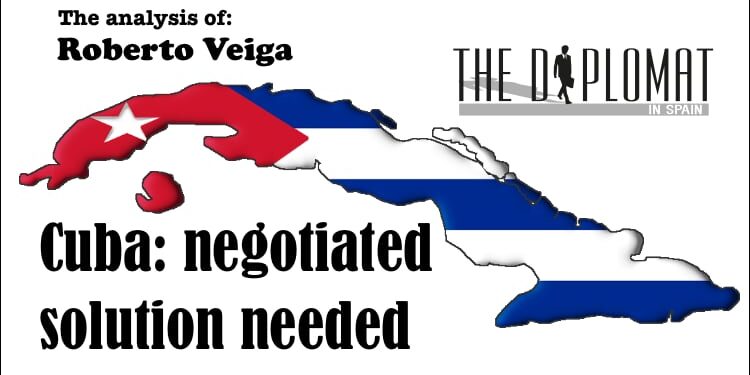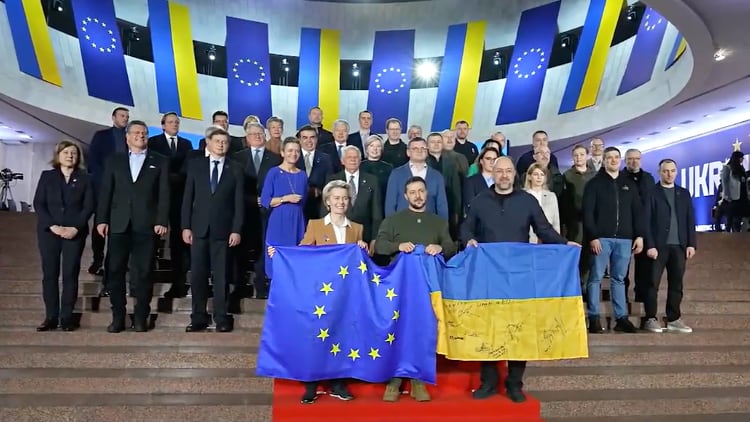Roberto Veiga González
Lawyer and political scientist / Collaborator of Fundación Alternativas
T
he Cuban crisis demands an urgent solution, but it is difficult to achieve. The Cuban power squandered the opportunities to transform the socio-political model and currently lacks the conditions for a strategy to get the country out of the crisis without jeopardizing the security and interests of the political elite.
Some people appeal to the fact that the exhaustion of power could happen, but we must consider that, in this dynamic of integral exhaustion, the people exhaust themselves more quickly and in a greater dimension. Supporting this option could result in social annihilation.
Some also consider that this vicious circle could be broken through social protests that overthrow the government, and this would not be out of the question, but we must consider two issues. The citizenry is suffering from a crushing exhaustion and the power has outlined its capabilities to destroy at any cost the protests that may endanger it. In the meantime, it is cruel to call upon the suffering people to engage in a dramatic confrontation with the custodians of power in the streets.
It is also necessary to consider that the political and civil activism opposed to officialdom has not been able to foreshadow a new beginning for the country. Recognizing this is a responsible realism. Neither will Cuba be able to get out of the crisis without a pragmatic relationship with the United States, and there does not seem to be enough interest for that in that country.
Thus, it seems that Cuba is trapped in a political limbo. Therefore, an agreed opening is essential, in the form of two parallel processes, one between Cubans -which would be the fundamental political reason for any process- and the other between both countries.
Such a beginning should be based on two radical commitments. In favor of concrete Cubans who currently suffer too much hardship, and of broad and non-negotiable horizons regarding human rights. But also willing to travel narrow paths to achieve them, which are typical of any process of this nature.
For this, it would be necessary to involve the Cuban power and the U.S. establishment, but this requires incentives and a few certainties. At the same time, any possibility of a solution would have to go through the dynamization of an area of civil and political society -both on the island and in the diaspora- willing to seek a solution.
Certainly, Cuban society does not enjoy “sufficient political weight”, but it does have “potential political weight”, because it is essential to overcome the crisis; and the powers of the United States need -politically- an opening of the Cuban State to that society in order to be able to promote an effective normalization of bilateral relations. Such a task would also require a set of international facilitators who, among other things, would legitimize before the parties the political trust necessary for the progress of all those who should be involved.
Perhaps the Cuban government could not begin a reconstruction of coexistence and well-being without knowing the probable involvement of the United States, but it could provide the cornerstone of all this. That is to say, making the decision to get out of the crisis, with an agenda/framework for the development of coexistence among Cubans and welfare, the acceptance of pragmatic relations between Cuba and the United States, and the beginning of a climate of understanding with the area of civil and political societies willing to transcend the circumstances and achieve a solution.
Likewise, Cuban power would demand certain conditions to do so without jeopardizing the security and interests of the political elite. For example, facilities to promote the development of a real economy, which would begin to offer welfare and reduce social despair and hopelessness; agreements on economic, social and political transformations that would guarantee the necessary gradualness; and a Cuban “Helsinki” agreement that would establish the foundations and legal framework for such parallel processes.
Possibly, the U.S. government could be disposed if, for example, the increase of welfare in Cuba is able to limit emigration to the United States; Cuba increases its contribution to the mechanisms for the regional fight against organized crime; a bilateral agreement for a mutually beneficial economic relationship is feasible; and thus reinforces its legitimacy in Latin America in terms of peaceful conflict resolution and cooperation on issues of common interest.
To this end, it would be essential to establish the key issues and outline a possible path for these two parallel processes. The topics could be linked in various ways, in cycles, although both sides will require that changes on the part of the Other be clearly verifiable. And the subjects could be the following:
From Cuba: release of political prisoners; institutionalization of the Constitutional Guarantees Chamber that endorses Law 140/2021, with the capacity to demand that the Constitution be directly applied and thus not be imprisoned by lower-ranking legislation that contradicts it; institutionalization of an open economy; dialogue with the civil and political societies willing to find a solution; dialogues on the necessary electoral reforms and other institutions; and institutionalization of these reforms.
From the United States: removal of Cuba from the list of countries sponsoring terrorism; establishment of economic relations between private Cuban and US companies, with access to finance, technology and markets; support for Cuba’s access to international financial institutions, beginning with the International Monetary Fund and the World Bank; institutionalization of family, sports, cultural, educational, academic, scientific and humanitarian exchanges; contribute to the creation in Cuba of institutions that offer credit to all companies; and suspend the authorization of new processes under the exercise of Title III of the Helms-Burton Act.
Cuba is debating between a complex, slow and modest solution or, if political time runs out, its perhaps definitive installation in the fourth world. The latter would increase poverty, establish a chaotic governance, increase the migratory flow and facilitate the development of organized crime with international participation. In short, Cuba would cease to be just an exhausted country and would also become a hemispheric danger.
© Fundación Alternativas / All rights reserved







